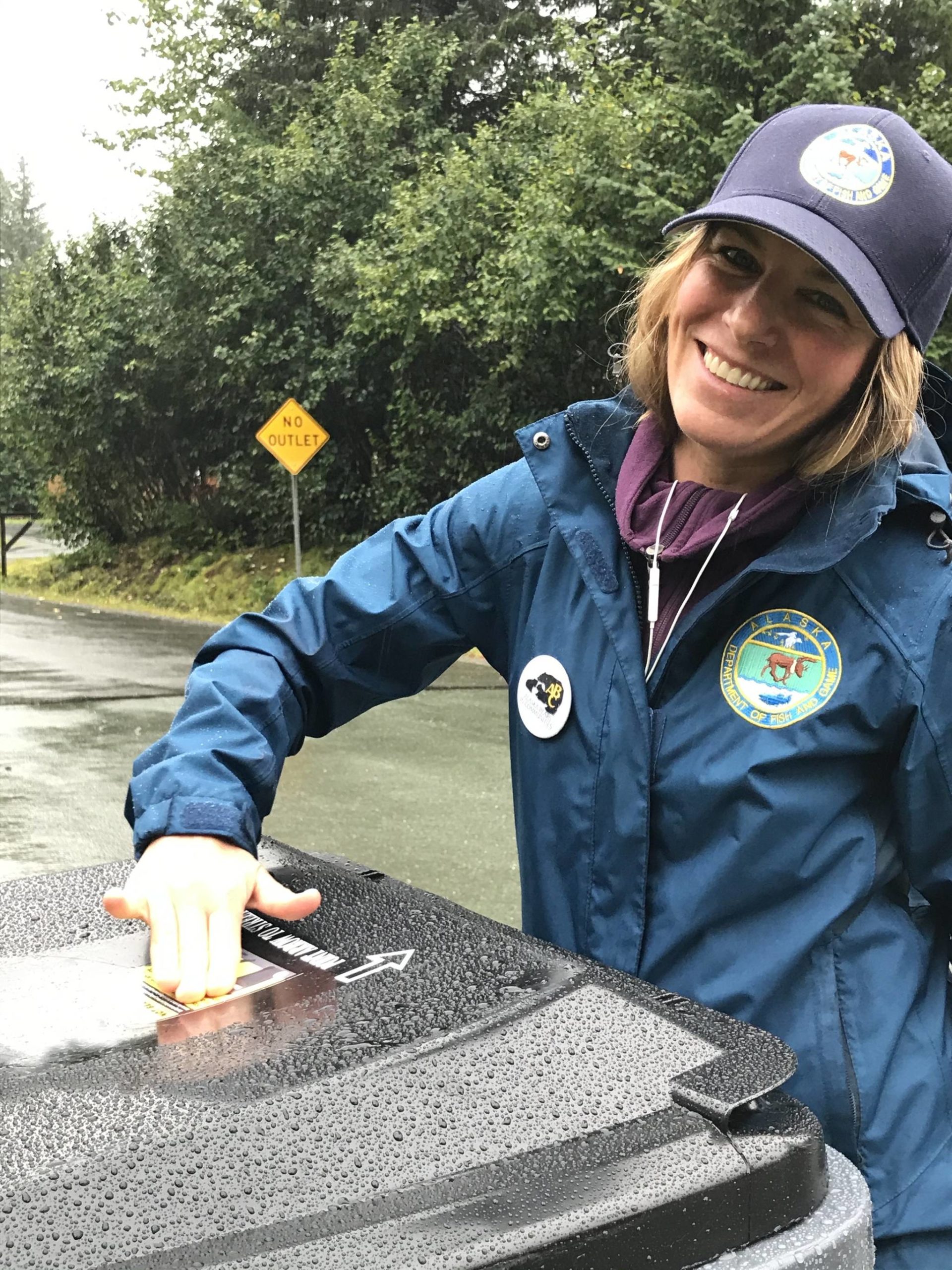A record-setting summer of bear calls has led to rising public concern with the increasingly bold animals.
“We live in a spectacular bear habitat. That’s the short answer,” said Abby McAllister, a wildlife educator with the Alaska Department of Fish and Game, in a phone interview. “Why do they come into town? They’re often in search of food. They’re optimistic omnivores.”
McAllister, along with other members of the Juneau Bear Committee, are spending this week putting stickers on trash cans that are less than effective at withstanding some of North America’s largest wild omnivores. The committee has members from the Department of Fish and Game, the City and Borough of Juneau, the Juneau Police Department and Alaska Waste Connection, as well as other volunteer groups.
[Hospital asks for money to address long-term pandemic needs]
“There is so much food available for them to eat,” said Roy Churchwell, an area biologist at Department of Fish and Game. “In years with fewer natural foods, there is ample human produced food around town.”
In years in which berry and salmon crops are relatively anemic like this one, in other words, bears will search elsewhere for sustenance, McAllister said. In many cases, that means coming into town.
“This situation is compounded when bears do not have a lot of other natural food available. If there are ample natural foods, most bears will prefer to forage on natural foods,” McAllister said. “Our berry crop was not that great. And news from around the state, our salmon runs weren’t great either.”
Record highs
The previous record for bear calls to JPD, Department of Fish and Game and others was set in 2018, said Churchwell. The record then was 619.
This year has seen 679, Churchwell said.
“The easy answer is that we have to make it harder to get human foods than natural food,” Churchwell said. “It might be necessary to take the decision out of the public’s hands by providing bear-resistant roll carts.”
This year has seen nine bears euthanized and four relocated, Churchwell said. While eating trash is not considered a dangerous behavior, getting habituated to human behavior and relying on human food together can be a dangerous combination, McAllister said.
“When you have a bear that’s food-conditioned and habituated that’s dangerous. He thinks that Dumpster is his Dumpster. And he’ll defend it,” McAllister said. “That’s why everyone is sitting up a little straighter.”
While Dumpsters are more bear-resistant, there’s truly no such thing as being bear-proof, McAllister said. He cited a local example.
“This bear had taken the reinforced metal lids of the Dumpster and bent them up at 90 degrees like a TIE Fighter from ‘Star Wars,’” McAllister said. “Most bears cannot do that. It must have been a bruiser.”
No such thing as bear-proof
Many have raised concerns about the flimsiness of issued trash cans, as well. Many trash cans don’t even approach bear-resistant status, said Alaska Waste site manager Loren Brown,
“The current ones that have a little red dial are not bear-resistant,” Brown said in a phone interview.
Bear-resistant cans are available for renting, though Alaska Waste currently has none in stock, Brown said. Another shipment of 350 bear-resistant cans will arrive later in the autumn, Brown says they’re working to phase out obsolete bear-resistant cans from the 1,500 in circulation to get rid of cans that there’s no replacement parts or active vendors for. Bear-resistant cans are more expensive to rent, Brown said, owing to their considerably more expensive construction, materials, and complexity.
“The waiting list for bear-resistant cans is approximately 100 people right now. We had cans up to August this year, which is better than last year. We continue to order more,” Brown said. “For the Dumpster part, we’re trying to innovate new things here to help with bear break-ins. We have bear bars and some additional add-ons to Dumpsters. We are seeing it to be effective.”
More consistency and better pick-up times, alongside improved trash cans, could help reduce bear encounters, said John Bush, a Juneau resident concerned about bears in close contact with the people of Juneau. Currently, Alaska Waste recommends having trash cans on the curb no later than 6 a.m. to guarantee pickup. CBJ ordinance forbids bringing the cans out before 4 a.m., the morning of garbage day.
“I get it out there at 6 o’clock and sometimes they don’t come by until I get off work. If the school buses can do it, the trash guys can do it,” Bush said in a phone interview. “How many people have to break the rules because they work all night? Or they’re working early in the morning?”
Variation in timing of pickups can occur because of things like roadwork or drivers subbing in for another driver who aren’t as familiar with the most efficient route, Brown said.
“Living in bear country takes a little bit of maintenance. We try to operate and help out as much as we can,” Brown said. “The education piece is the only solution. It doesn’t matter what we put out there, bears have gotten into it. We’re trying to find answers, we’re trying to find solutions. But at the end of the day, it’s all elective here.”
• Contact reporter Michael S. Lockett at 757-621-1197 or mlockett@juneauempire.com.

